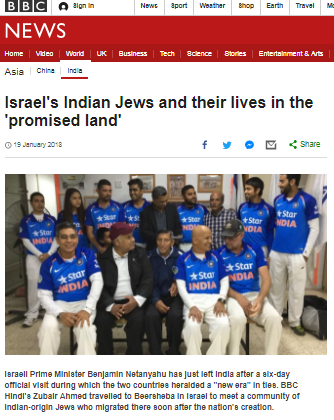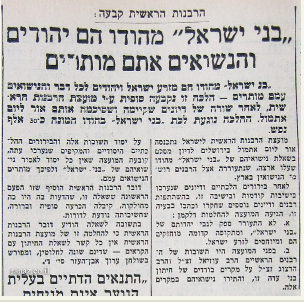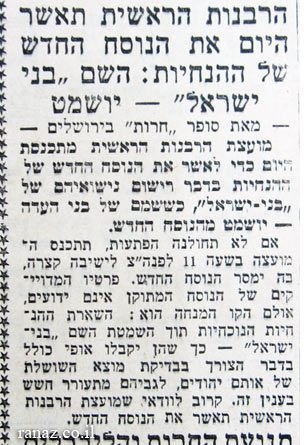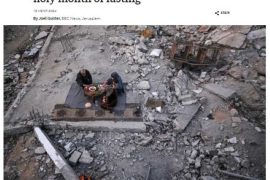On January 19th an article written by the BBC Hindi journalist Zubair Ahmed was published on the BBC News website’s ‘India’ and ‘Middle East’ pages under the title “Israel’s Indian Jews and their lives in the ‘promised land’“.
The article relates to one of the communities of Jews who immigrated to Israel from India – Bene Israel – and readers are told that: [emphasis added]
“…the biggest crisis faced by the community was in 1962 when the chief rabbinate prohibited Bene Israelis from marrying Jews from other communities.
Dr Weil said the community was up in arms. “They used to conduct sit-in strikes outside the chief rabbinate’s office saying they were Jews for more than 2,000 years and had the right to marry who they wanted.”
It took two years, but they finally succeeded in seeing their demands fulfilled.”
But is that account accurate? Did Israel’s Chief Rabbinate really ban members of the Bene Israel group from marrying other Israeli Jews in 1962?
Here is an article published in the ‘Herut’ newspaper on October 20th 1961 under the headline “The Chief Rabbinate rules: ‘Bene Israel’ from India are Jews and marriage with them is permitted”.

As the Jerusalem Post recounts: [emphasis added]
“Despite the fact that Sephardic Chief Rabbi Itzhak Nissim stated in 1961 that there was no foundation to prohibit marriage between Bene Israel and other Jews, and that “the sect of the Bene Israel in India is of the seed of the House of Israel without any doubt,” several rabbis in Israel still refused to marry Bene Israel to other Jews.
In 1962, the Israeli Chief Rabbinate appointed a commission of four rabbis to meet with representatives of the Bene Israel to research their customs. Apparently concerned about previous intermarriage and mamzerut, the committee learned that divorce was not an aspect of their culture at all, and they did not permit widows to re-marry, as per Indian customs at the time. This also meant that any concerns regarding the practice of levirate marriage (man’s duty to marry brother’s widow if she is childless) or halizah (ceremony to avoid levirate marriage) were not relevant.”
In late February 1962 the JTA reported that:
“The Chief Rabbinate was accused this weekend by Indian Jews settled in Israel with having “reversed” a ruling which ended a lengthy dispute over the status of such Jews in regard to marriage with other Jews in Israel.
The Chief Rabbinate had ruled last October that members of Indian Jewry, known as Bene Israel, were full Jews and could therefore wed other Jews. The Actions Committee of Bene Israel, charged that new directives for such marriages were a reversal of the October ruling.
The charge was based on the fact that the new directives required Israeli rabbis to ascertain whether Bene Israel applicants for marriages had parents and forebears who were Jews and also instructed rabbinical registrars to refer the applicant to the district rabbinical court “where doubts existed.”
Chief Rabbi Yitzhak Nissim issued a statement in reply, expressing surprise about the Actions Committee charge. He said that similar regulations applied to all marriage applications in Israel.”
A few days later the then President of Israel – Itzhak Ben-Zvi – issued a statement on the topic.
“President Ben-Zvi came out vigorously today in support of the recent Chief Rabbinate’s decision permitting marriages with the Bene Israel immigrants from India. He declared that the decision should be welcomed by all leaders and members of the Bene Israel community in Israel.
The President made his statement in a comment on criticism of recent directives given by the rabbinate to marriage registrars concerning inquiry into the Jewishness of parents and grandparents of Bene Israel marriage applicants. He hailed the decision recognizing Bene Israel members as full Jews. He expressed the hope that the directives would not be misinterpreted to the extent that such criticism might negate the decision.
The President also said that he felt that the leaders of the Bene Israel community had no justification for objecting to the questions since rabbis had a complete right to question all marriage applicants concerning such Jewish matters. His statement was expected to sooth the controversy and serve as a cue for moderation both for rabbis performing such marriages and for Bene Israel members.”

That statement from the president did not however succeed in calming tempers and the Bene Israel group launched a series of protests and hunger strikes, culminating in a resolution passed by the Knesset in 1964.
“The series of demonstrations spurred the Knesset to take action, passing the Bene Israel resolution on August 16, which was read in an emergency Knesset session the next day. The resolution stressed the equal rights of Bene Israel, condemned the Chief Rabbinate and called upon it to dispel any feelings of discrimination among Bene Israel and the general public. It passed with a 43 to 2 vote. […]
“The Israeli government reiterates that it sees the Bene Israel community from India as Jews… without any restrictions or differences, equal in their rights to all other Jews in all respects, including matters of matrimony,” then-prime minister Levi Eshkol stated at the special Knesset session.” […]
The Chief Rabbinate responded to the Knesset resolution, revoking all references to the Bene Israel in the directive and substituting it with a general order which was made applicable to anyone whose family status was in doubt. […]
In other words, while the Bene Israel community doubtless suffered discrimination and some individual rabbis did for a time refuse to perform marriage services, the BBC’s claim that in 1962 “the chief rabbinate prohibited Bene Israelis from marrying Jews from other communities” is inaccurate and misleading.




